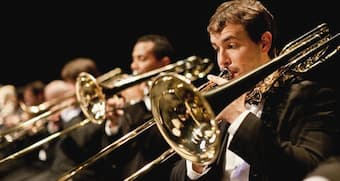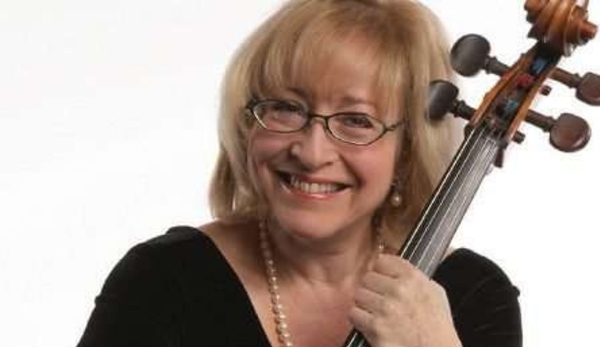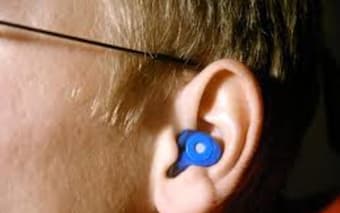
© Classic FM
It’s no secret that our world is becoming toxically noisy. People like to make a lot of noise. In fact, for some musicians, producing a huge sound is a goal in itself. But at what cost? Like overuse syndromes, the vast majority of hearing loss problems are cumulative. Unlike overuse injuries, hearing loss is permanent. Musicians cannot afford any hearing impairment. It’s of the utmost importance for us to protect our ability to produce our art and to be able to interact with our world.
More people are afflicted with loss of hearing than all other occupational injuries combined, which makes hearing the leading occupational disease.
Too Loud (and Too High), Too Close and Too Long

Janet Horvath
Noise-induced hearing loss is a combination of your exposure time, the noise level, the peak level, and your proximity to the sound. Orchestras, bands, and rock concerts are loud and often reach damaging decibel levels. Any exposure above 125 dB, even for seconds, is risky.
Many of us are unaware that devastating, life-changing, and painful ear injuries can also occur due to loud sound even without hearing loss. Despite being extremely careful, one evening of raucous music made me into a musician who can’t tolerate sound.
Please listen to my story. Then read on for prevention strategies:
Podcast: A Musician Who Can’t Tolerate Sound
1. Practice more softly. It’s important to practice and rehearse at softer dynamics. Save it for the concert and avoid practice in small rooms with hard surfaces. The smaller the room you practice in, the greater the risk with the louder dynamics. We all sound fabulous in a tiled bathroom, but such spaces can be harmful to our hearing.
2. Distance yourself. Whenever possible, increase the space between yourself and the noise. On stage this means away from the percussion, brass, and piccolo. (The highest frequencies are the most damaging.) When distancing is impossible, use hearing protection and/or barriers or shields.
3. Hearing protection. Carry the small foam plugs or the off the shelf reusable plug in your case, pocket, purse and locker. These are inexpensive and effective. They can cut down 20 dBA when fully and properly inserted. The downside is that the occlusion effect is pronounced with these plugs (when you hear your own swallowing, your tonguing, and your voice too much) and this can interfere with performing.

© www.rnz.co.nz
Etymotic Research ER-15 & ER-25 Musicians Earplugs are designed specifically for musicians to reduce noise levels by 15 or 25 dBA, and since they are a deep-fitted earplug, there is less occlusion. These must be custom-fitted by an audiologist. In Minnesota, we were able to negotiate a precedent-setting arrangement whereby the management agreed to pay a portion of the cost up to $120 for these earplugs. Violinists, consider wearing an earplug in your left ear. One can comfortably perform with these earplugs. I also like the Matrix Howard Leight disposable earplug. Since they have a solid center they are easy to insert and/or quickly take out for an important solo.
4. Minimize your exposure. Be vigilant about your exposure, both on and off the job. Be vocal about your discomfort and insist on amplifiers being turned down or redirected, and insist on a shield and/or plugs. Away from the job, avoid loud music and be aware of your exposure to environmental noise. Wear ear protection when you operate your snow-blower, leaf-blower, lawn mower, chain saw, or drill. Think moderation. If you go to, or perform in, a loud concert or sports event on Friday, don’t mow your lawn until Sunday. Give yourself auditory rest periods of 16-18 hours whenever possible. Carry plugs in your car, travel bag, instrument case, locker, and taped onto your lawn mower.
5. Alternate your repertoire. Whenever possible, practice alternating noisy pieces with quieter ones. Different repertoire places different demands on the body as well. This protects you from overusing one particular muscle group and your ears.
The importance of our hearing is immeasurable. Hearing loss, like overuse syndromes, can occur due to a variety and a combination of factors. Be aware that hearing loss or injury, although usually cumulative, can occur due to one explosive event. Find out how to protect yourself, prevent life-changing hearing injury, and learn how to advocate for a safer workplace.
Every orchestra, band, rock group, and large choir needs to appoint its own expert team to address the risks and implement strategies. Noise induced hearing loss is preventable. With careful exploration of the issues, we can protect our hearing and continue to make music unthreatened. For more information read on!
*this podcast has appeared on the Miller Aud-Cast
presented by the Missouri Review
For more of the best in classical music, sign up to our E-Newsletter
